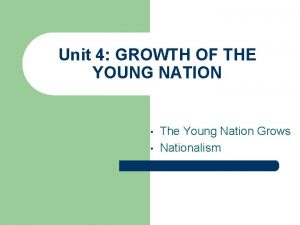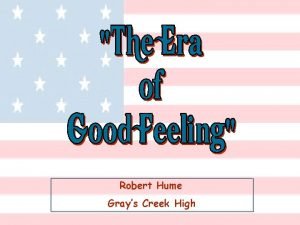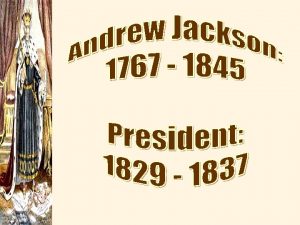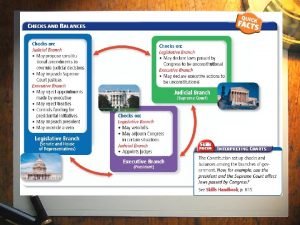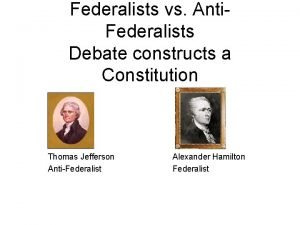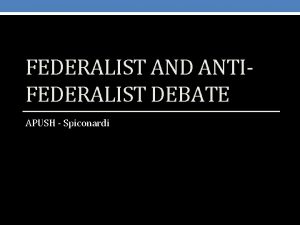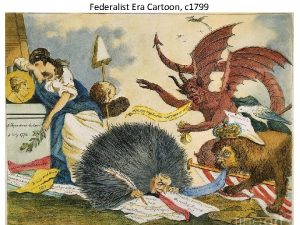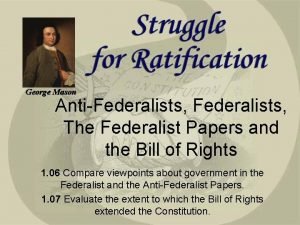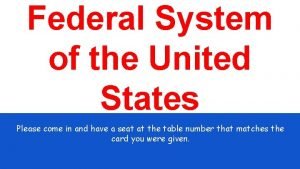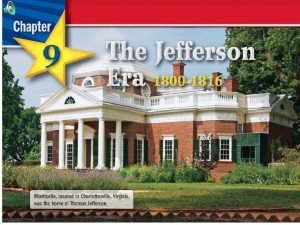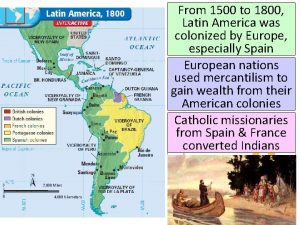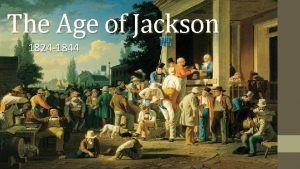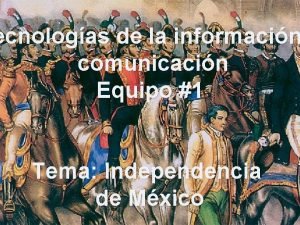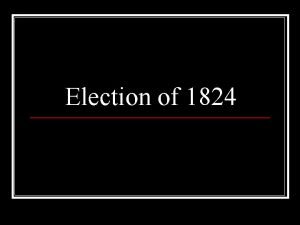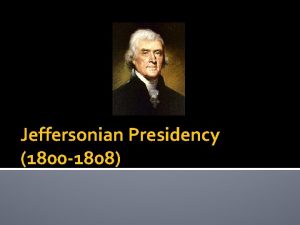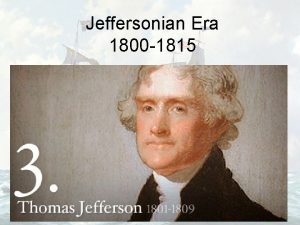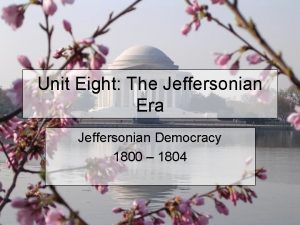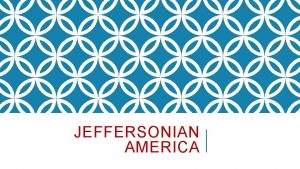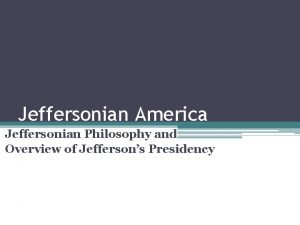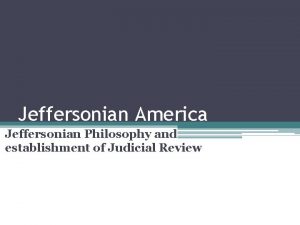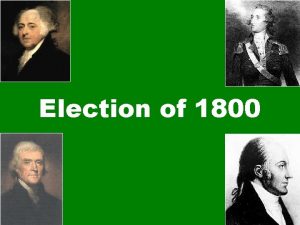Jeffersonian America 1800 1824 Election of 1800 Federalist












- Slides: 12

Jeffersonian America 1800 -1824

Election of 1800 � Federalist Adams VS. Democratic Republican Jefferson � Jefferson wins � Inaugural speech on March 4 th 1801 � Adams left town early in the morning leaving only a short note for T. J. that there were 7 horses and 2 carriages in the Whitehouse stables. � Jefferson: “We are all Republicans, We are all Federalists. ” � First “Peaceful” transfer of power under the new constitution. � Important, but also it must be noted that Jefferson ushered in momentous changes in America. � In a way his election really IS a revolution � Numerous historians call it a 2 nd American Revolution

Jefferson’s Platform � “Federalists look backwards, not forwards for improvement…” � “Federalists favor the education of our ancestors…” � “We can no longer say there is nothing new under the sun. for this whole chapter in the history of man is new. ” � “The great extent of our republic is new. Its sparse habitation is new. The mighty wave of public opinion which has rolled over it is new. ” � (bit of exaggeration since T. J. only won 73 to 65) � Years later Jefferson himself calls it a “ 2 nd American Revolution”

The Principles of Jefferson’s Government � Jefferson spent the 1790’s arguing against the Federalists � For augmenting federal power � Establishing a ruling elite at the country’s political center � Jefferson saw this government as too hierarchical, like Great Britain’s � Jefferson championed the new French idea of progress � He sought to change social relations AND the political style of the nation � Federalists believed that after voting, citizens should allow their elected officials to govern. � Jeffersonians believed in seeing “popular sovereignty” literally. � Insisted on the public’s right to engage in vigorous politicking

The Principles of Jefferson’s Gov’t cont. � Generally, Jeffersonians believed that more americans should be able to vote, while the federal government should have far less size and power � Jefferson’s time in office resulted in expanding personal rights and shrinking government � Opposed to seeing church and state as ultimate authorities

The Jeffersonian Age Jeffersonian Republicanism – theory of government 1. people should control the government 2. simple government best suited people’s needs � Removed a whole cohort of young Federalists from civil and military offices � Eliminated domestic taxes � Reduced the national debt � Shrank the size of the bureaucracy (in spite of growth) � Hastened the conveyance of land in the public domain to ordinary farmers � Replaced federalist formality with a nonchalance in manners � Not to be forgotten is that he did not see women, Africans, or natives to fit into the grand scheme of human destiny, since “Nature” had excluded them

Jeffersonian Age Cont. � “Society promotes our happiness positively by uniting our affections, while government only restrains our vices…” � Jefferson attached the idea of liberty to the promise of prosperity � Formerly, during the Revolution, liberty was attached to selfsacrifice and self-denial � Optimism fueled by expanding frontier of uncultivated land west of the Appalachian Mountains. � Favored a 50 acre land requirement to vote, but also advocated giving all landless men 50 acres.

Jefferson’s Heirs � Madison and Monroe were close political allies. � Both Shared his strict constructionist interpretation of the constitution. � Both Shared his determination to open the world to free trade � Both Shared his anti-British foreign Policy � Jefferson’s principles became ingrained in the fabric of the American political identity � Recent History has been critical � Jefferson the slave owner � Jefferson the typical white male political leader � He accepted disenfranchisement of women and african-americans � He is an 18 th century man but it is an error to underestimate how revolutionary he is � Battle against prejudices against ordinary white men � Crusade against the tyrannies of the past � Attempt to minimize the conspicuous abuses of a status-conscience society whose elite routinely belittled the self-governing capacity of “lower classes”

Legacy of Jefferson “Both critics and champions keep the Jefferson legacy alive. Benignly presiding today in a little Greek temple on the Potomac near the place where in March 1801 he became president, Jefferson’s statue profoundly evokes the man and his philosophy and reminds us of the links he forged among American identity and the primacy of natural rights, the politics of limited government and the belief in a world steadily moving toward liberty and justice for all…” --Joyce Appleby—

Madison’s presidency � Causes of war of 1812 � British Policy of Impressment � British officials in Canada selling weapons to Native American tribes � Young group of “western” congressmen called “War Hawks” demand justice � American military weak from Jeffersonian budget cuts � Only reason Britain didn’t conquer the United States was because they were tied up fighting Napoleon � Only real American victory came after treaty was already signed � Effects of War of 1812 � End of the Federalist Party � Encouraged growth of American Industries � Confirmed status of the United States as a free and independent Nation

Jefferson’s Legacy Cont. �End of the Federalist Party � Federalist Opposition to the War of 1812 accelerated their loss of popular support around the nation � Victory against the Native Americans in the war allowed for rapid expansion into “Deep South” �Unresolved issues: � State Power vs. Federal Power � President vs. Congress � North vs. South vs. West � Jeffersonian Ideal of the “citizen farmer” vs. increasing power and influence of business � How to regulate white/native relations

Era of Good Feelings (1816 -1824) � James Monroe: Last of the “Founding Fathers” Presidents � Monroe Doctrine � Missouri Compromise � Next Generation Leaders � John Q. Adams � Henry C lay � John C. Calhoun � Daniel Webster � Andrew Jackson � The Republican Party Splinters � Tariffs � Bridges, Canals, Roads � Native American Relations � Bank of the United States
 Election of 1824 map
Election of 1824 map Hume foreclosures
Hume foreclosures Was andrew jackson a president
Was andrew jackson a president Are you a federalist or anti federalist quiz
Are you a federalist or anti federalist quiz Federalists and anti-federalists
Federalists and anti-federalists Federalists vs antifederalists apush
Federalists vs antifederalists apush Federalist cartoons
Federalist cartoons George mason federalist
George mason federalist Anti free trade political cartoon
Anti free trade political cartoon The election of 1800 showed that
The election of 1800 showed that Latin america 1500 to 1800
Latin america 1500 to 1800 The age of jackson 1824-1844
The age of jackson 1824-1844 Avolida
Avolida
